Congress’ old vote bank still en mass with AAP
By Nivedita Bhardwaj, TwoCircles.net,
New Delhi: A mere mention of ‘Modi’ – Prime Minister Narendra Modi – evokes an immediate burst of anger from a bunch of elderly women sitting in the balmy winter sun outside their quarters at Valmiki Colony.
“Naam na lo usaka!” (Don’t even mention his name) says one almost muttering an expletive under her breath. “Why are you asking?” asks another. “We don’t even want to discuss anything about him,” says a third one.
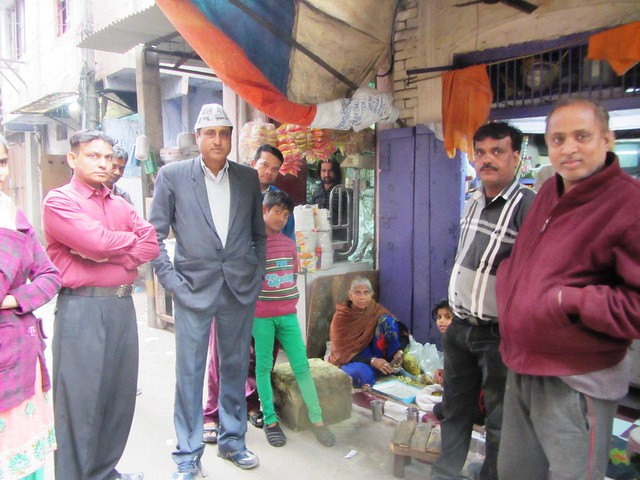
Staunch AAP supporters at Karol Bagh
Ahead of the 2013 assembly polls, Arvind Kerjiwal of the Aam Aadmi Party (AAP) had started his campaign from the Valmiki Colony on the fringe of New Delhi Municipal Council (NDMC) area, part of the plush New Delhi constituency. A day before taking oath too he had held a meeting in this colony.
Circa 2014 – perhaps to usurp this support base keeping an eye on the due assembly polls – Modi had launched his ambitious ‘Swatch Bharat’ campaign from here on October 2. “But instead of allowing us to meet Modi, the security people actually locked us inside,” says an elderly woman, refusing to tell either her name or any of her friends’.
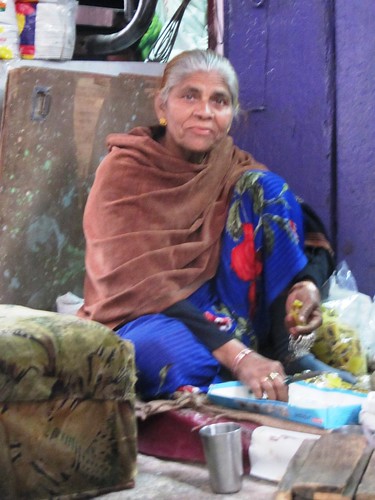
Premvati, a resident of Manakpura, says: “They are claiming money will be deposited in bank accounts later but we will need to pay Rs 710 for a cylinder. Tell me, do poor people have this kind of money at home?”
Standing along with them, Bharati Taank, a DU student, explains the resentment of these ladies. “Whenever Kejriwal comes here, he mixes freely with all of us sans any security. As against this, Modi’s security did not even allow us to step out of our homes,” the collegian says.
Renu, a young housewife, is still angry at the episode. “When he (Modi) came to our colony, it was a hell of a time for us. When locked in, I didn’t watch him on TV either.”
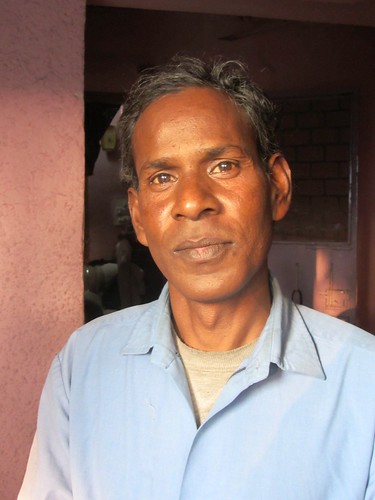
Lakhan, an NDMC employee, whose wife’s job was regularised during Arvind Kejriwal-led Aam Aadmi Party governme nt’s 49 days rule
But this is not the only reason why Kejriwal and his AAP are popular in pockets such as Valmiki Colony and other such clusters in Delhi. When the AAP ruled Delhi for 49 years after the December 2013 assembly elections, Kejriwal as New Delhi MLA and the chief minister, had regularised hundreds of contractual employees. Scores of them stay at Valmiki Colony.
“My wife is one of those who were regularised during Kejriwal’s tenure. We were given only promised all these many year but he actually did it in just 49 days,” says Lakhan, who stays barely 50 feet from where the bunch of ladies are sitting.

Amit Kumar, a resident of Trilokpuri, says work was done in his area only in those areas where voting was more
His son, his wife and scores of others in his colony are Kejriwal fans. Most of them recall when he had come for the first time three years ago when no one thought he might be the chief minister one day. But working their way through 2012, 2013 and now the entire 2014, Kejriwal and AAP first slowly made inroads into and now able to retain their support base in colonies such as Valmiki Colony, slum clustets, jhuggi-jhompri (JJ) Colonies/clusters and also in unauthorised colonies.
Saroj, a middle aged housewife, says, “Once people retire from here, they ought to leave these houses etc. Our children are educated, they need jobs. Modi government has promised, let’s see if he delivers it?”
Dinesh Kumar, a temporary NDMC employee, echoes the sentiments: “We are hoping if AAP comes back to power, those waiting for almost 8-10 years, will be regularised. Our colony alone has some 500-600 youth who were regularised. I am hoping at least other 500 too will benefit.”
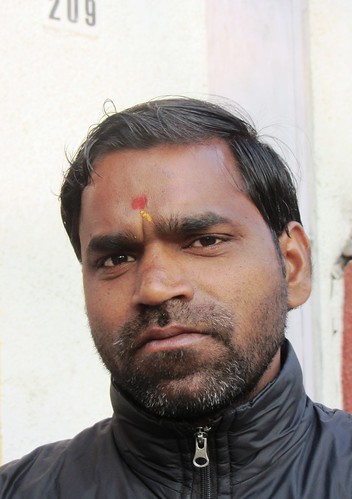
Dinesh Kumar, a resident of Valmiki Colony, is hoping AAP forms the government so that more youth like him are regularised in government jobs
Delhi’s seat pattern:
A total of 12 out of 70 seats are reserved (SC) in Delhi. The dalits constitute almost 25 % of the total population. Apart from the reserved seats, the dalit votes will also influence several other seats that have JJ clusters, unauthorised colonies and slums. And going by the response that it is receiving to its rallies and road shows, it is clear the this traditional vote bank of the grand old party – Congress – that AAP had usurped in 2013, is still with it. AAP had won nine out of these 12 seats in 2013 December but BJP had won all the seven Parliamentary seats in 2014 Lok Sabha polls.
And possibly, because of this, the central BJP leadership is bringing in all and every prominent dalit face to garner attention and seek votes from the traditional Congress voters. And possibly this is the reason that AAP’s promise of free water and half rates for power has been aped by both BJP and Congress in one way or the other in their respective manifestos.

Renu from Valmiki Colony says residents are angry as they were locked up when Prime Minister Narendra Modi came in the area for Swatch Bharat campaign on October 2
Karol Bagh:
In another area of the capital, Karol Bagh, the scene is more or less the same. But unlike in New Delhi constituency, the BJP is pulling out all plugs here. Krishna Teerath, three-term Congress MLA, former MP and a former union minister in the UPA government, joined the BJP a day ahead of the announcement of candidates by the saffron party. A well-known dalit face, incidentally, she got another known dalit face – Udit Raj – to campaign for her. Raj had joined the BJP ahead of the 2014 Lok Sabha polls.
In Manakpura, an almost 100-year-old settlement in the heart of the city, part of Karol Bagh constituency, people appeared eager to vote for AAP and vocally supported Kejriwal’s every move then in 2013 and now in 2015 too.
Ram Pal, who is into milk business, says, “Kejriwal did so many things in 49 days that Congress failed to do in 65 years. We have been khandaani Congressi (traditional Congress voters) but now vouching for AAP.”
Echoed Lalit Kumar Singh, a businessman, “When Kejriwal used to talk of reduced electricity bills, others poked fun at him. Now, see … even the Congress is promising that.”

Valmiki Bhawan on the fringe of NDMC area where Mahatma Gandhi used to stay often
Reacting to the much touted Jan Dhan bank accounts, Premvati, who works from her home, says, “They are claiming money will be deposited in bank accounts later but we will need to pay Rs 710 for a cylinder. Tell me, do poor people have this kind of money at home?”
Talk of poll promises and what has been done or not done by any party, LIC agent Ramchandra Bharti, a resident of Gali Paathshalawali, Karol Bagh, says, “The criterion are different for Lok Sabha, assembly and municipal elections. But unfortunately for us, neither the MLA nor the MLA candidates were of any use when it comes to solving our problems related to water, drains etc.”
“But AAP’s 49-days was a good time for us. It was the film’s trailer. We now want full film of five years,” he says.
Claiming that BJP which has been ruling in municipal corporations during last three terms did nothing for them, the residents claimed, during AAP’s 49 day rule, municipal employees had started reporting for work, poor had started getting medicines at government dispensaries and in general, corruption had come down.
But for Manakpura, a cluster with almost one lakh and above population, people have been waiting for regularisation. “That is our biggest problem. BJP and Congress did nothing. AAP has promised to do it,” Pradeep Kumar, a tailor from the area, said.
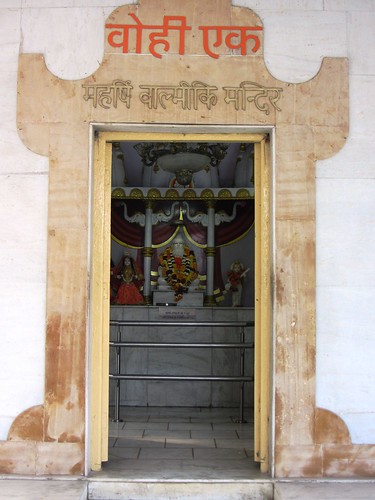
Close up of Valmiki temple in Valmiki Colony in New Delhi constituency
Trilokpuri:
In yet another corner of the city, Trilokpuri in east Delhi, election campaigning is inching towards end on Thursday. This was the scene of communal riots in October 2014 but except for invocations about the riots by political leaders, life goes on as usual in most parts.
People are back to basics. The civic amenities are still in a dire need of a major push. When most areas of East Delhi got a revamp ahead of the Commonwealth Games in 2010, fringe areas such as these – especially notorious due to its proximity to Uttar Pradesh’s crime belt – the slum-cluster, resettlement and redevelopment colonies here were left untouched.
While AAP did rallies, road shows and also focused on their favourite mode of campaign, the door-to-door, BJP too help rallies and local street meetings. BJP replaced Sunil Vaid, who had won in December 2013, with his wife Archana Vaid.
Amit Kumar, who is into a private job, says, “Vaid had started work during the time he was MLA (After AAP government resigned in February 2014, President’s Rule was imposed in Delhi and the assembly was dissolved only ahead of the announcement of Delhi assembly elections in January 2015) but as far as I can see, work has been carried out only in those pockets that voted for him.”
But Kumar also warns that despite what media perceives as a stain on his tenure due to the communal riots, Vaid is as popular as ever and his wife is sure to get elected.
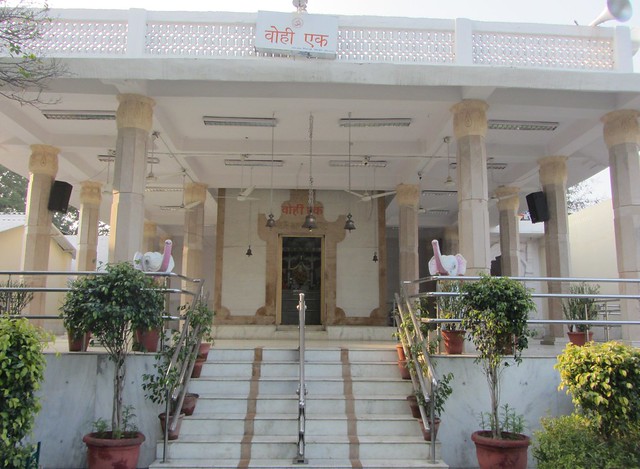
Valmiki temple in Valmiki Colony in New Delhi constituency
What is Congress doing?
After the massive drubbing that it received in 2013 Assembly polls (it won just eight seats) and after it relegated to the third position in the 2014 Lok Sabha polls, the Congress is claiming to gear up to regain its position and has been silently working to wean back its lost turf. At least, that’s what the party leaders are claim.
Says a party leader, “We are not going big this time for obvious reasons but what we are trying to do is to reach out to SC-dominated pockets, rural areas and JJ clusters. After all, these have been traditionally our voters!”
Related:

